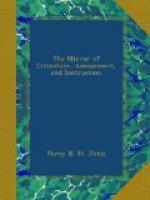Wherefore, unto one alone,
Are those sounds and visions known?
Wherefore hath that spell of power
Dark and dread,
On her soul, a baleful dower,
Thus been shed?
Oh! in those deep-seeing eyes,
No strange gift of mystery lies!
She is lone where once she moved
Fair, and happy, and beloved!
Sunny smiles were glancing round her,
Tendrils of kind hearts had bound her;
Now those silver cords are broken,
Those bright looks have left no token,
Not one trace on all the earth,
Save her memory of her mirth.
She is lone and lingering now,
Dreams have gather’d o’er
her brow,
Midst gay song and children’s play,
She is dwelling far away;
Seeing what none else may see—
Haunted still her place must be!
New Monthly Magazine.
* * * * *
THE GATHERER.
A snapper up of unconsidered trifles.
SHAKSPEARE
* * * * *
OCTOGENARIAN REMINISCENCES.
In 1760, a Mr. Cross was prompter at Drury Lane Theatre, and a Mr. Saunders the principal machinist. Saunders laboured under an idea that he was qualified for a turf-man, and, like most who are afflicted with that disorder, suffered severely. The animals he kept, instead of being safe running horses for him, generally made him a safe stalking-horse for others. Upon one occasion he came to the theatre in great ill-humour, having just received the account of a race which he had lost. Cross was busily engaged in writing, and cross at the interruption he met with from Saunders’s repeated exclamations against his jockey; he at length looked up, and said impatiently, “His fault—his fault—how was it his fault?” “Why,” said Saunders, “the d—d rascal ran my horse against a wagon.” “Umph!” replied Cross, “I never knew a horse of yours that was fit to run against any thing else!”
A musician of the name of Goodall, who belonged to the orchestra of the Theatre Royal, Richmond, in 1767, was fonder of his, or any other man’s, bottle than his own bassoon. The natural consequence was, that he frequently failed in his attendances at the theatre. Upon one occasion, after an absence of a week, he returned in the middle of the performances for the evening. A piece was being acted called the “Intriguing Chambermaid,” in which there is a character of an old gentleman called Mr. Goodall, who comes on as from a journey, followed by a servant carrying his portmanteau. To him there enters a lady, Mrs. Highman, whose first exclamation is, “Bless my eyes, what do I see? Mr. Goodall returned?” At that precise moment Old Goodall happened to put his head into the orchestra, and fancying himself addressed, called out, “Lord bless you, ma’am, I’ve been here this half hour.”




